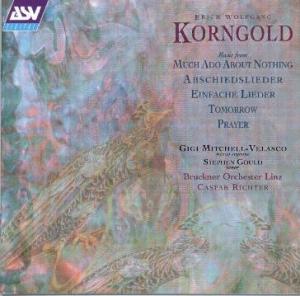Curio Corner
Erich Wolfgang KORNGOLD
Tomorrow; Einfache Lieder(Simple Songs), Suite: Much Ado About Nothing, Abschiedlieder (Songs of Farewell),
Gigi Mitchell-Velasco (mezzo-soprano) and Stephen Gould (tenor) and Jochem Hochstenbach (piano) Ladies of the Mozart Choir, LinzBruckner Orchester Linz conducted by Caspar Richter
ASV CD DCA 1131 [66:09]

Another excellent concert in ASV's continuing Korngold series. New Korngold recordings seem to be pouring out at the moment.
The piece that has the most interest for film music enthusiasts is alas the least interesting work in this highly recommended compilation. Tomorrow was written for the film The Constant Nymph for orchestra, (heavenly) female choir and mezzo-soprano soloist. It is a small-scale symphonic poem and to be frank it is not top-drawer Korngold. It's all too melodramatic - even for Korngold and on this evidence one can see why some wags (unjustifiably) criticised the whole of Korngold's output as being more corn than gold. Its sombre, lugubrious opening is in the manner of a marche funèbre with tolling bells recalling his operas Die tote Stadt and Violanta. It then proceeds in autumnal nostalgia as the (doomed) soloist sings: "When I am gone, The sun will rise as bright tomorrow morn …Beauty will live..." Maybe I just cannot dispel my imagined heavily saccharined over-the-top Hollywood scenario that probably accompanied this music. (I say imagined because the 1943 Warner Bros. film, The Constant Nymph that starred Charles Boyer and Joan Fontaine seems to be lost to view.) To their credit, Richter and his performers make this tear-jerking work as convincing as they can but then even the enthusiastic Charles Gerhardt with the National Philharmonic in his tribute to the cinematic Korngold ('The Sea Hawk' – 1972 RCA Gold Seal GD 87890) could do much with this piece! [The words on that recording are different by the way, more 'Hollywoodish' beginning with "When I am gone another love will cheer thee" and ending with "The sun will rise as bright tomorrow morn".]
The purely orchestral Much Ado About Nothing Suite for a smaller ensemble with harmonium and piano is magic under Richter's sure direction. The Garden Music which is really the Prelude to Act IV is receiving its premiere recording here – why I cannot imagine for it is quite enchanting. It opens with distant horn calls to give the piece a brief initial sense of perspective, then more intimate glistening string-harp-and-harmonium figures, and rippling piano arpeggios, suggest birdsong and flowers nodding in zephyr breezes – all in gentle romantic waltz time. The bustling Overture is merry, comic and theatrical with another of Korngold's attractive broad melodies to which one can imagine Errol Flynn courting Olivia de Havilland. The quirky use of the harmonium is another highlight of this tongue-in-cheek overture. The Hornpipe Prelude to Act II is a high-spirited delight with clever writing for the horn while the Holzapfel and Schiehwein music is a grotesquely comic march that anticipates Korngold's more risible Sherwood Forest scenes from his film score, The Adventures of Robin Hood. The Intermezzo is a dreamy nocturne beginning with a sweetly melancholic passage for piano and cello – another lovely Korngold creation. The final movement, The Maiden in the Bridal Chamber is another beautiful melody – full of character (hesitant romance tinged with comic overtones) as Hero prepares for her wedding with decidedly mixed feelings.
I review the song cycles, beautifully sung with rapt accompaniments by the Bruckner Linz Orchestra in great detail over on our sister site MusicWeb.
Tomorrow apart, this is another winner in ASV's continuing Korngold series with raptly beautiful renditions of the orchestral songs and a beguiling Much Ado About Nothing Suite.
Ian Lace
[Not rated]
Return to Index